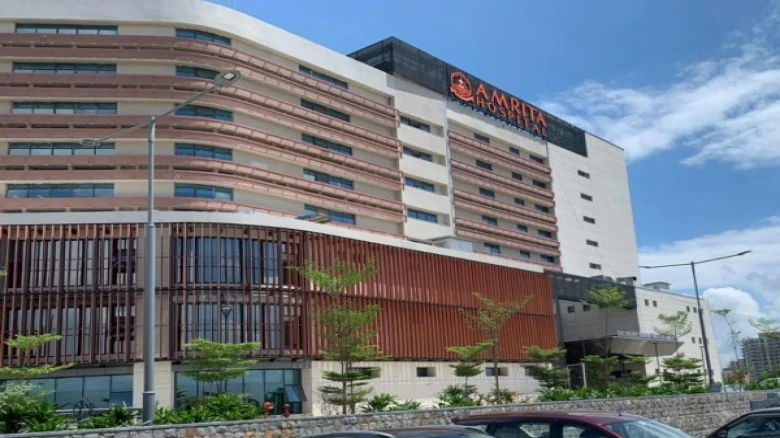Regional

The new Amrita Hospital is inspired by its founder Amritanandamayi Devi's notion of "compassion." It aims to treat pain and go big on home-based palliative care.
Digital Desk: As you enter the huge campus of Asia's largest private multi-specialty Amrita Hospital, you will be greeted with a gracious "Namah Shivay."
The 130-acre institution on the outskirts of the national capital, founded by spiritual leader Mata Amritanandamayi Devi, affectionately known as Amma, is nearing completion. The infrastructure has so far cost Rs 4,000 crore. Prime Minister Narendra Modi will open the 2,600-bed hospital today.
The overall centre, with a built-up area of 1 crore square feet, includes a four-star hotel, a medical college, a nursing college, a college for allied health sciences, a rehabilitation centre, a helipad for patient transportation, and a 498-room guesthouse for patients' family members, among other amenities.
The Amrita Hospital in Kochi, Kerala, is one of the most prestigious medical institutions in South Asia, and it served as the foundation for the one in Faridabad.
The centre is nearing completion as the debut date approaches. The hospital plans to open 550 beds in the first phase, then expand to 750 in the next 18 months. The hospital is expected to reach its full capacity of 2,600 beds by 2027-29.
The concept of the latest hospital, with more than 12,000 employees and 700 doctors, differs from the current ones, including their own hospital in Kerala's Kochi, according to officials here.
The administration intends to encourage doctors and workers to avoid having "a paunch" or "a bulging belly" and to be healthy by taking the stairs rather than the elevator. "It is mandatory for everyone, including me," Dr Sanjeev K Singh, Resident Medical Director at Amrita Hospital in Faridabad, stated.
The goal is to go big on integrating alternative medicine, particularly ayurveda, yoga, and homeopathy, with contemporary medications, with a statue of "Sushruta" - an ancient Indian physician and the world's first surgeon - confronting the 14-story hospital complex.
The hospital's goal under the project, driven by Amma's notion of "compassion," is to provide home-based facilities such as interventions for controlling pain to maintain quality of life.
"Thoda dard seh lo' (bear some more pain) or'surgery hui hai to dard hoga hi' (pain is expected after surgery) is a harmful practice," Dr Singh explained in an exclusive interview.
The trust-based, not-for-profit hospital intends to closely monitor each patient's stay, with the team of doctors being asked on a regular basis to justify the person's billing based on his/her stay in the hospital or ICU, cost of diagnostics or pharmacy, or the tests prescribed.
Along with palliative care, the hospital intends to invest heavily in home health care. While certain services will be provided for free, others will be reasonably priced.
"Our primary focus is on chronically or terminally ill people." They may be unable to get to the hospital due to financial constraints, or they may be unable to travel, therefore we will come to their homes," Dr Singh explained.
To sustain the quality of life, the hospital intends to provide home-based services such as pain management interventions.
The hospital will feature a dedicated palliative and pain management section that will examine all patients admitted to the facility. The institute intends to adopt villages as well.
The in-house laboratory is about 3 lakh square feet in size. Doctors will be assigned to teach at the hospital's own medical and nursing schools. These doctors would then be assigned responsibilities to go out into the community and learn about the incidence of diseases there.
The hospital is separated into three wings that serve 81 specialties for patients, including cancer, cardiac sciences, neurosciences, gastro-sciences, renal sciences, bone disorders and trauma, transplants, and mother and child care.
A second seven-story structure is dedicated to children and is billed as the world's largest super-specialty hospital for children.
The hospital's idea is unusual in that each level is a "mini-hospital" in its own right.
For example, once you visit the floor of your specialty, you will find registration, nurse evaluation, doctor consultation, blood tests, diagnostics (such as ECG, ultrasound, and endoscopy), a restaurant, and other services.
Launching a new rule for all doctors, the hospital has come up with counseling rooms with audio-video recording.
In an effort to develop a new culture in the institute, Amrita Hospital's management plans to enforce "rational medication practices" to reduce pricing.
Leave A Comment